| |||||
| Centuries: | |||||
|---|---|---|---|---|---|
| Decades: | |||||
| See also: | List of years in Norway | ||||
Events in the year 1374 in Norway.
| |||||
| Centuries: | |||||
|---|---|---|---|---|---|
| Decades: | |||||
| See also: | List of years in Norway | ||||
Events in the year 1374 in Norway.
Haakon Magnusson, byname Toresfostre, was King of Norway from 1093 to 1095. Haakon was only partially recognized within Norway and his reign was thus of limited significance. He has generally not been counted in the numbered series of Norwegian kings.

Albert was King of Sweden from 1364 to 1389 and Duke of Mecklenburg-Schwerin from 1384 to 1412.

Magnus Eriksson was King of Sweden from 1319 to 1364, King of Norway as Magnus VII from 1319 to 1355, and ruler of Scania from 1332 to 1360. By adversaries he has been called Magnus Smek.
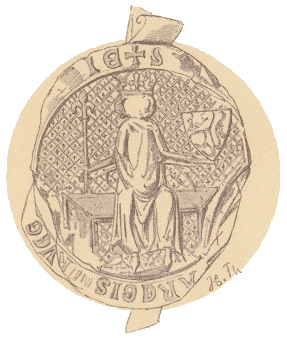
Haakon VI, also known as Håkan Magnusson, was King of Norway from 1343 until his death and King of Sweden between 1362 and 1364. He is sometimes known as Haakon Magnusson the Younger to distinguish him from his great-grandfather, Haakon V.
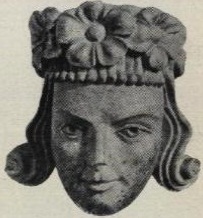
Haakon V Magnusson was King of Norway from 1299 until 1319.

Eric Magnusson was the King of Norway from 1280 until 1299.
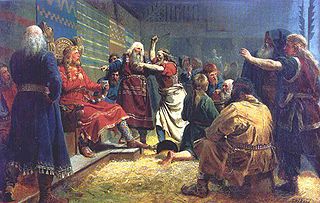
Haakon, also spelled Håkon, Hakon, Håkan, or Háukon or Hákon, is an older spelling of the modern Norwegian form of the Old Norwegian masculine first name Hákon meaning "High Son" from há and konr. An old English form is Hacon as in Haconby, Hacon's Village. The name appears in Scottish Gaelic as Àcainn, as seen in the place-name Kyleakin, meaning 'Haakon's Narrows', being named after King Haakon IV of Norway.

Erik Magnusson, sometimes known as Erik XII, was King of Sweden and lord of Scania in 1344–1359. He was a co-ruler with his father, King Magnus Eriksson, from 1356 until his death in 1359.

The Fairhair dynasty was a family of kings founded by Harald I of Norway which united and ruled Norway with few interruptions from the latter half of the 9th century. In the traditional view, this lasted until 1387, however, many modern scholars view this rule as lasting only three generations, ending with Harald Greycloak in the late 10th century. The moniker "Fairhair dynasty" is a retrospective construction: in their lifetime what little traces there are refer to them consistently as "Ynglings".

Erik Magnusson was a Swedish duke and the second son of King Magnus Ladulås. His duchy consisted of large parts of Sweden, as well as smaller parts of Norway and Denmark. He had a troubled relationship with his brother, King Birger Magnusson, with several uprisings as a result. His son, Magnus, became the king of Norway and Sweden. The Erik's Chronicle, the oldest Swedish chronicle, is named for him.
Rikissa Birgersdotter, also known as Rixa, Richeza, Richilda and Regitze, was Queen of Norway as the wife of the co-king Haakon Haakonson, and later Princess of Werle as wife of Henry I, Prince of Mecklenburg-Güstrow.
Magnusson, or Magnússon, is a surname of Scandinavian origin, meaning son of Magnus. It may refer to:
Ingeborg Eriksdotter was Queen of Norway and the wife of King Magnus VI. She was born a Danish princess, daughter of Eric IV of Denmark. As queen dowager, she played an important part in politics during the minority of her son King Eirik II of Norway in 1280-82.
Beatrix of Bavaria was Queen of Sweden as the wife of King Eric XII of Sweden (1339–1359) who co-ruled Sweden with his father King Magnus Eriksson.
Haakon Magnusson or Håkon Magnusson may refer to:

The House of Sverre was a royal house or dynasty which ruled, at various times in history, the Kingdom of Norway, hereunder the kingdom's realms, and the Kingdom of Scotland. The house was founded with King Sverre Sigurdsson. It provided the rulers of Norway from 1184 to 1319.
Events in the year 1316 in Norway.
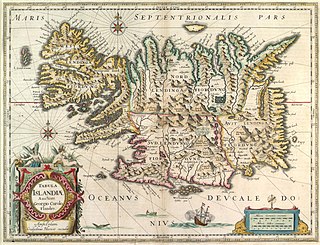
Nobility in Iceland may refer to the following:
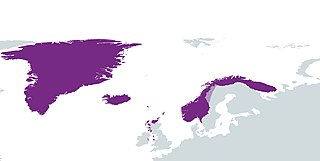
The term Norwegian Realm and Old Kingdom of Norway refer to the Kingdom of Norway's peak of power at the 13th century after a long period of civil war before 1240. The kingdom was a loosely unified nation including the territory of modern-day Norway, modern-day Swedish territory of Jämtland, Herjedalen, Ranrike (Bohuslän) and Idre and Särna, as well as Norway's overseas possessions which had been settled by Norwegian seafarers for centuries before being annexed or incorporated into the kingdom as 'tax territories'. To the North, Norway also bordered extensive tax territories on the mainland. Norway, whose expansionism starts from the very foundation of the Kingdom in 872, reached the peak of its power in the years between 1240 and 1319.